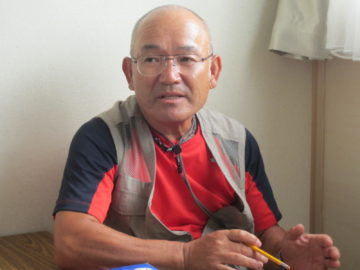On the morning of March 15, The Town issued a directive to evacuate Tsushima. The plan was to go to Nihonmatsu City. They said Nihonmatsu was already full of evacuees from Namie, so they were not sure whether we could evacuate there, stay there, or even have food available there. At any rate, since the evacuation directive was out, they insisted that we follow it. We were told to evacuate by car or by bus, but that no pets were allowed on the bus. Because we had a pet and our car had some gasoline, and if going to Nihonmatsu couldn’t guarantee a place for us there, we thought we might as well call on our relatives in Fukushima City. I asked my wife and my mother-in-law whether they were ready to bear the hardship of getting stuck if we ran out of gasoline along the way. They hung their heads in silence. Our pet was a member of our family; we just couldn’t leave it behind. I tried to call our relative in Fukushima to inform them that we were coming, but there was still no reception. We had no choice but to go without informing them. We didn’t expect the gasoline to last, but the road was downhill at many places and the mileage was good, so we arrived at Fukushima City safely. As soon as we reached the City, our mobile reception recovered, and we were able to check on the safety of our siblings and relatives. My older brother’s twenty-five-year-old daughter had been missing since March 11. Without delay, we visited our relatives and told them what happened up to that day. We asked them of the situation in Namie, and once again became keenly aware of how terrible the earthquake, tsunami and nuclear accident were. We stayed at our relatives’ for about a month. I am truly grateful they vacated a room for us. Even though our relatives’ house suffered damage from the earthquake, they offered us meals, allowed us to take baths, and gave us kerosene for heating. Words cannot describe how grateful we are. We then moved to Shiki No Sato in Inawashiro [a hotel used as an evacuation shelter in the center of Fukushima Prefecture]. The three of us and our dog moved there on April 11, and stayed for about five months. At last we moved to Miyashiro Temporary Housing Area, where we live now.
 When I look back over the past year, what I can say as someone who went through the disaster is that we should always keep vital items on hand, in case of emergency. Firstly, we need food, water, radio, toilet paper, toiletries, cash, credit cards, Also, we should always try to maintain a full tank in the car, and have a spare can ready, if possible. Flashlights and mobile phones are essential and they are very helpful when you travel at night. Try to keep these items in one place which is accessible during an emergency. Secondly, we need to prepare our home for earthquakes. Secure cabinets and furniture with straps to wall studs. Keep dangerous items away from your head when you go to bed. I’d also like to recommend: securing roof tiles so they won’t fall, protecting your head when you exit your house, and staying away from concrete block walls and gates. Protecting yourself is most important; but in case something happens to you, having an ID with you is critical. My brother’s missing daughter was found two weeks later in a car. But the body was so badly damaged that her identity could only be established only by her driver’s license.
When I look back over the past year, what I can say as someone who went through the disaster is that we should always keep vital items on hand, in case of emergency. Firstly, we need food, water, radio, toilet paper, toiletries, cash, credit cards, Also, we should always try to maintain a full tank in the car, and have a spare can ready, if possible. Flashlights and mobile phones are essential and they are very helpful when you travel at night. Try to keep these items in one place which is accessible during an emergency. Secondly, we need to prepare our home for earthquakes. Secure cabinets and furniture with straps to wall studs. Keep dangerous items away from your head when you go to bed. I’d also like to recommend: securing roof tiles so they won’t fall, protecting your head when you exit your house, and staying away from concrete block walls and gates. Protecting yourself is most important; but in case something happens to you, having an ID with you is critical. My brother’s missing daughter was found two weeks later in a car. But the body was so badly damaged that her identity could only be established only by her driver’s license.

